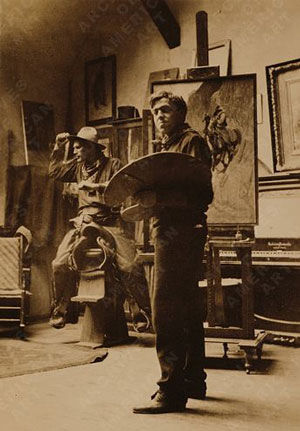
Courtesy of wikipedia
Aside from his father, the one person Wyeth reported to be a major influence in his life and work was his wife Betty, whom he married in 1940; they had two children, Nicholas and James. Betty acted as a manager of sorts with regard to her husband’s art career. Andrew has credited his wife for making him the artist he came to be, not by teaching him in the way that his father did, but by believing in him and his ideas wholeheartedly and refusing to allow him to take up any other profession other than painting. Andrew’s youngest child, who came to be known by his nickname “Jamie”, followed the Wyeth family tradition, and also become an artist. Andrew Wyeth died in his sleep at the age of 91 after suffering from a short illness.
An Artist in Training
Looking at Andrew Wyeth’s works, one would think that he endured years of schooling. Not the case. In fact, Andrew never received any formal training except from his father, who he recognized as one of the most powerful influences and inspirations for his art. As a teen, Andrew even did some illustrations under his father’s name, but soon realized that his passion was for painting. Andrew was home-schooled, which provided his father with plenty of opportunity to steer both his son’s mind and his passion. Although Andrew likened his sheltered existence to a kind of happy jail, he reported gaining a great deal of focus from the experience.
Perhaps one of his father’s most impressive lessons came in the form of a letter, which prodded Wyeth to paint for the purpose and love of painting, not for any desired or intended impact. According to his father, those artists who painted “to score a hit” always missed the mark. Apparently, Andrew took his father’s words to heart, never showing anyone a painting in progress in order to ensure that their opinions (whether favorable or unfavorable) would not affect the process.